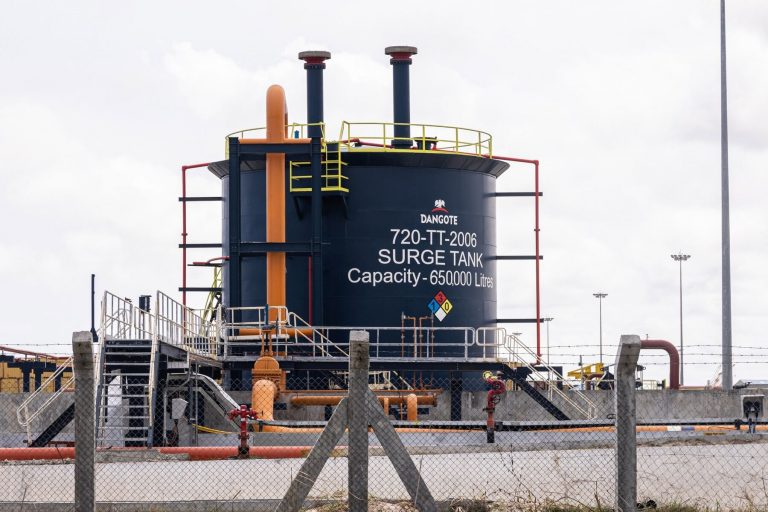
The President of Dangote Industries Limited has disclosed that the state-of-the-art refinery, with a capacity of 650,000 barrels per day (bpd), has stocked more than half a billion liters of petroleum and over N600 billion worth of refined products in its storage tanks.
Speaking over the weekend, Dangote reiterated that the refinery is fully capable of supplying Nigeria’s entire petrol demand without the need for imports.
“…As we speak right now, we have more than half a billion liters. The refinery is producing enough refined products, like gasoline, diesel, and kerosene, to meet 100 percent of Nigeria’s requirements,” he said.
Register for Tekedia Mini-MBA edition 17 (June 9 – Sept 6, 2025) today for early bird discounts. Do annual for access to Blucera.com.
Tekedia AI in Business Masterclass opens registrations.
Join Tekedia Capital Syndicate and co-invest in great global startups.
Register to become a better CEO or Director with Tekedia CEO & Director Program.
His comments came during a visit by a Zambian government delegation led by Energy Minister Makozo Chikote, who expressed admiration for the refinery’s scale and capabilities. The refinery, which has a processing capacity of 650,000 barrels per day, is the largest single-train refinery in the world, designed to refine Nigerian crude and supply both domestic and regional markets.
Dangote emphasized that beyond Nigeria, the facility is a strategic asset for Africa’s energy security and trade, in line with the African Continental Free Trade Area (AfCFTA).
“This refinery is not only for Nigeria; it is for Africa. We must sustain the African Continental Free Trade Area (AfCFTA) deal. We are trying to see how we trade with other African countries,” he said.
The Vice President of Dangote Industries Limited, Edwin Devakumar stated that the Refinery produces the best quality products as its core business strategy, and the capacity to other African countries and the Middle East.
“The project concept was to process the crude from Nigeria and add value. But we also wanted to provide some flexibility to process most of the African crudes and some of the Middle Eastern crudes,” Edwin said.
He added “In another concept, what we did was maximum value extraction. That is a process where every barrel of crude which goes in, the value addition should be the best.”
Edwin added: “The Refinery can meet all our requirements. 44 percent can meet the entire requirements of Nigeria, and 56 percent of the production would be exported. Every day, we produce lighter products of 104 million liters; 57 million liters of petrol every day; 20 million liters of jet fuel; and 27 million liters of diesel production.
“The local consumption is just around 46 million liters, and the remaining 58 million liters will be exported daily.”
However, despite these assurances, the NNPCL and independent marketers have continued to import petrol into the country, raising questions about why Nigeria is still spending scarce FX on imported fuel when a major refinery is now operational. According to the motor tanker vessel report for January 2025, a total of 212,870,340 liters of Premium Motor Spirit (PMS) was imported into Nigeria in January 2025, with the shipments arriving at Calabar and Lagos ports via motor tanker vessels.
Dangote’s Legal Battle Against Fuel Importation
Frustrated by the continued importation of petrol, Dangote has taken legal action against the NNPCL and other fuel importers. He had argued that imported petrol is not only more expensive but also adulterated, which poses a significant risk to vehicle engines and national fuel quality standards.
Dangote’s lawsuit seeks to block the importation of petrol into Nigeria, as he believes his refinery should be the primary source of refined fuel for the domestic market. However, the case is complicated by the Petroleum Industry Act (PIA), which deregulated the downstream sector and allows marketers to source petroleum products from anywhere in the world. The PIA, which was designed to encourage competition, technically empowers importers to bring in fuel if they find cheaper or more suitable options.
The Free Market Debate
Dangote insists that continuing to import fuel while a massive refinery sits underutilized is economically counterproductive. One of the key arguments for the Dangote Refinery was that it would help reduce Nigeria’s dependence on fuel imports, thereby easing pressure on the naira and saving the country billions of dollars in FX expenditures.
One of the most critical aspects of this ongoing issue is its impact on Nigeria’s currency and foreign exchange reserves. Fuel importation has been a major drain on Nigeria’s FX for years, contributing significantly to the country’s dollar scarcity. The rationale for supporting local refining was that it would eliminate the need for excessive fuel imports and ease the pressure on the naira, which has suffered severe depreciation over the past year.
If Dangote’s refinery were to fully take over Nigeria’s petrol supply, it could potentially save billions of dollars annually in import costs. However, with NNPCL and other marketers still bringing in foreign fuel, the anticipated FX relief has not yet been realized. This has led to growing concerns that Nigeria’s downstream petroleum sector is not operating in a manner that aligns with the country’s broader economic interests.
Furthermore, questions remain about the Port Harcourt Refinery, which the NNPCL claims has resumed operations. Energy experts have noted that if the refinery is truly operational, it should have added local supply to the market, drastically minimizing fuel imports. This has fueled speculation about whether the refinery is producing at commercial levels or merely undergoing test runs.
At the heart of this controversy is the balance between local refining and market competition. While the government initially pushed for self-sufficiency in refining, the PIA has opened the sector to free-market dynamics, allowing marketers to choose their suppliers. This has led to a standoff between Dangote’s push for a monopoly over Nigeria’s petrol supply and the marketers’ right to source fuel from alternative providers.



